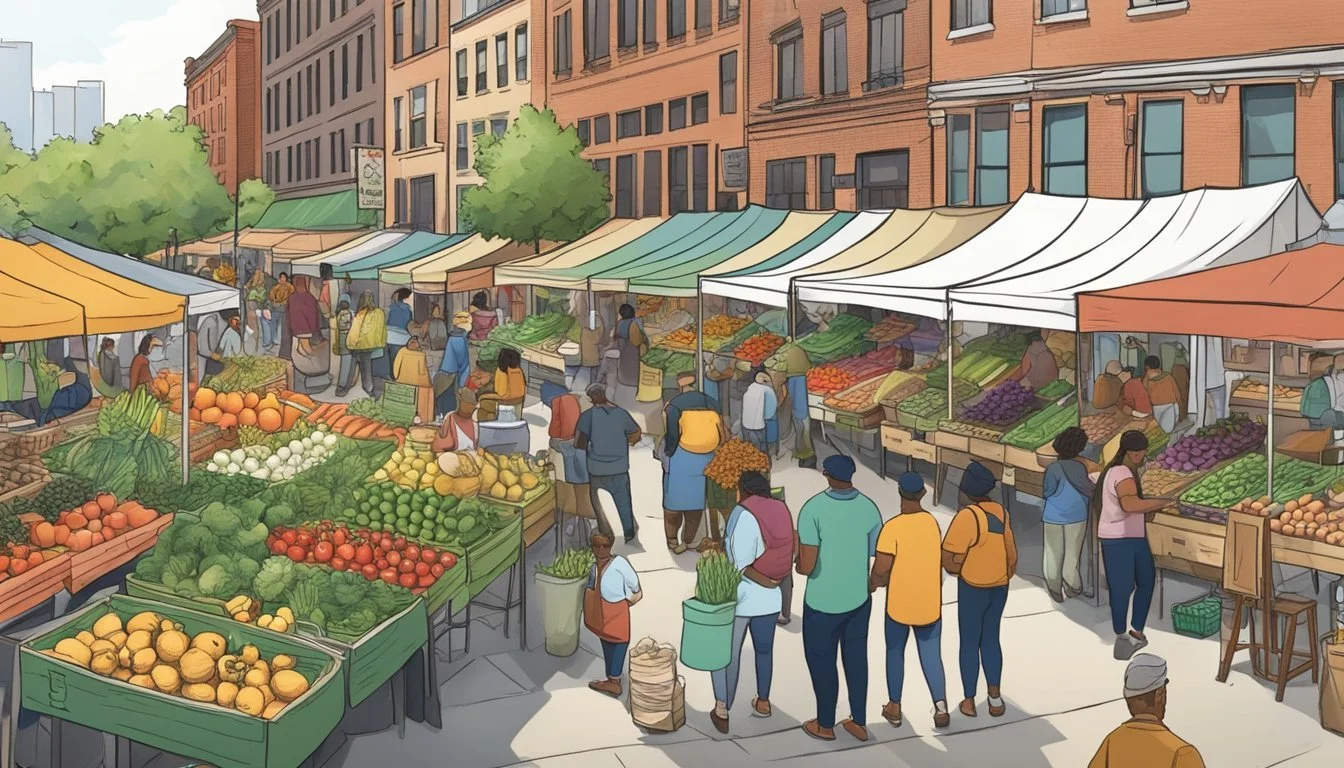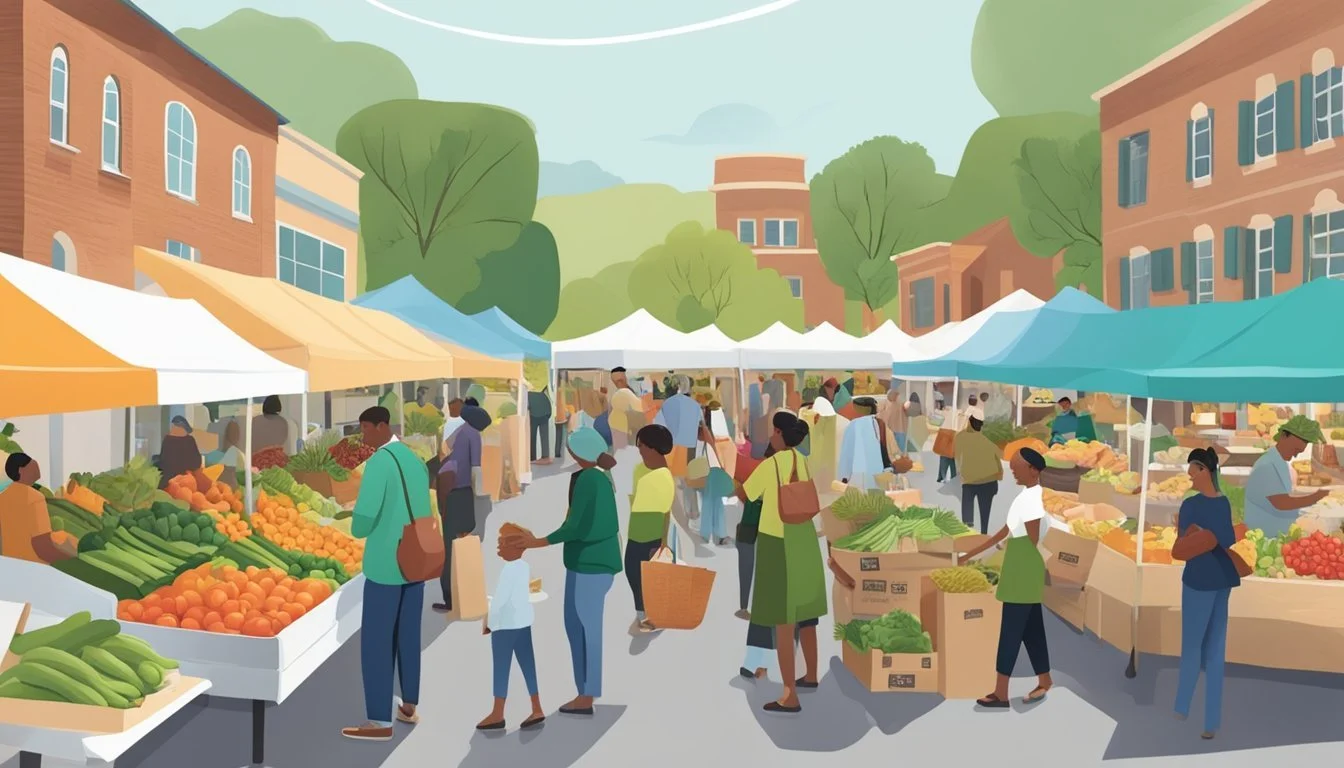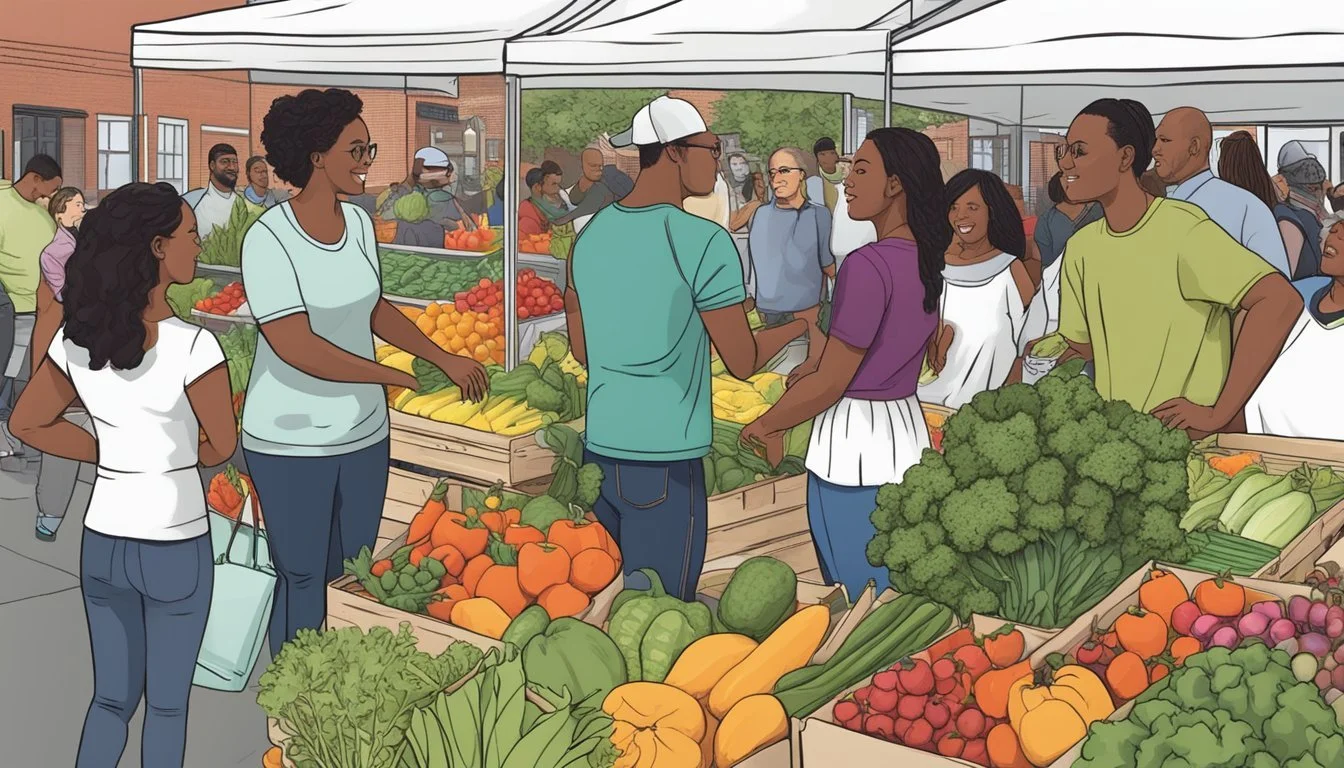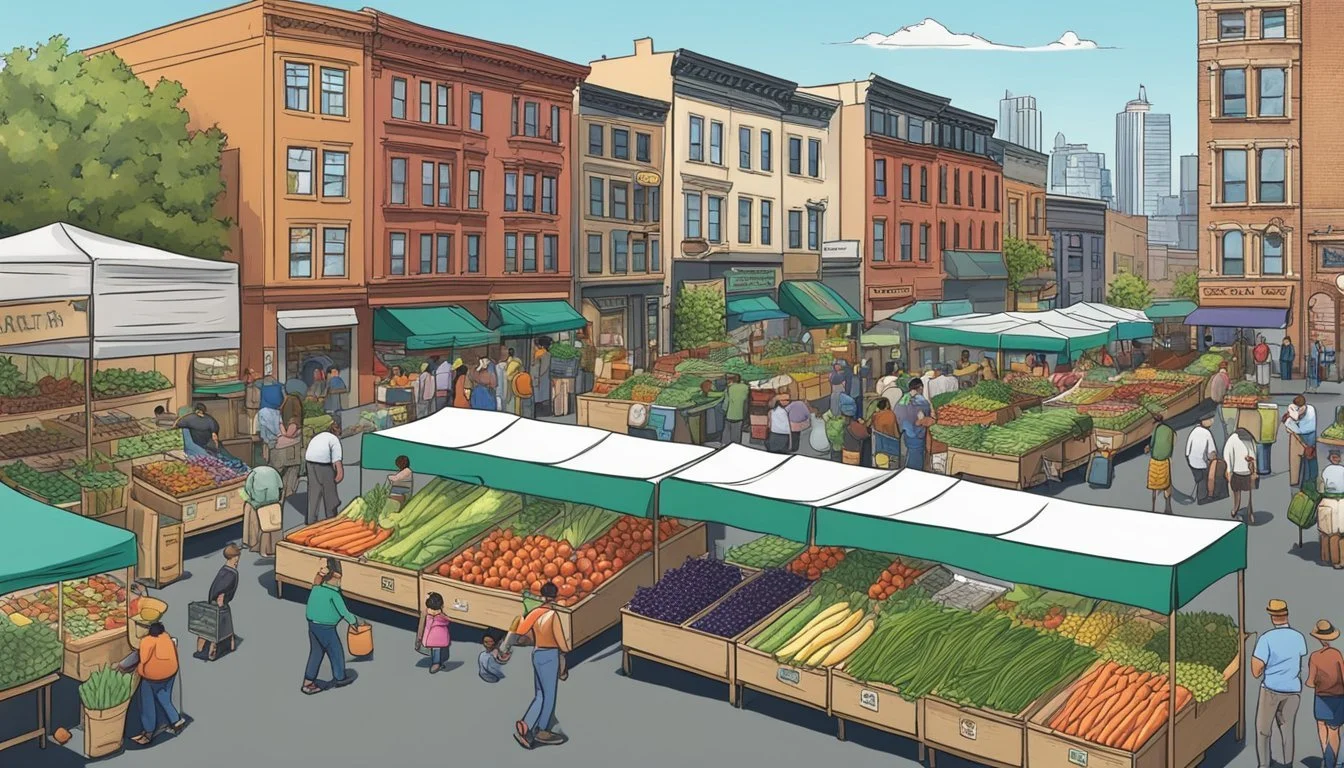Community Supported Agriculture (CSA) in Jersey City, NJ
A Guide to Local, Sustainable Food Options
Community Supported Agriculture, commonly known as CSA, has been gaining popularity in Jersey City, NJ as a sustainable approach to farming and food consumption. The city's residents actively participate in CSAs where they pre-purchase shares of a local farm's anticipated harvest. This model enables consumers to receive a regular supply of fresh, seasonal produce directly from the farms around them. In return, the farmers are provided with a reliable source of income at the start of the growing season, helping them with essential expenses such as seeds and equipment.
Jersey City boasts a network of CSA programs that connect the urban community with the surrounding agricultural land. By investing in these programs, members receive a diverse array of Jersey Fresh produce throughout the farming season. The direct farmer-to-consumer relationship fosters a deeper understanding of the food system, encourages local economic support, and enhances access to high-quality, nutritious food.
These programs extend beyond just produce; many offer additional options including eggs, dairy products, and meats. With options ranging from small bi-weekly shares to full harvest subscriptions, Jersey City residents can choose the level of support and amount of food that best fits their needs. This flexibility is a cornerstone of CSA programs and reflects the growing demand for local, sustainable, and community-oriented food solutions.
The Basics of Community Supported Agriculture (CSA)
Community Supported Agriculture, commonly referred to as CSA, is a model of farming and food distribution that forges a partnership between farmers and consumers. Members of the community commit to supporting a farm operation, often through the purchase of shares at the beginning of the growing season.
Purchasing Shares:
Consumers become members by buying a share of the anticipated harvest. This may require a single payment or installments. Share costs can range from approximately $400-$700 annually, but they may vary based on the farm's offerings and the region.
Member Benefits:
In exchange, members receive regular deliveries of fresh, locally grown produce. These deliveries typically consist of a variety of vegetables and may also include fruits, herbs, and other farm products.
Supporting Local Farms:
CSAs are vital in connecting consumers directly with their food sources, ensuring that the majority of the money spent on produce stays within the local community. Additionally, this model provides farmers with upfront payment, which can help to offset the early-season costs inherent in farming.
Shared Risk and Reward:
An integral aspect of CSA is the shared risk; members are made aware that they are subject to the same natural variables, such as weather conditions, that the farm experiences. This aspect creates a stronger consumer-farmer relationship and gives members a vested interest in the success of the farm's harvest.
By participating in CSA, members contribute to the sustainability of local agriculture in Jersey City, NJ, while benefiting from a regular supply of fresh food directly from the farm.
Advantages of Joining a CSA in Jersey City, NJ
Residents of Jersey City have the unique opportunity to enjoy the benefits of fresh, locally-sourced produce while directly supporting their farming community. Community Supported Agriculture (CSA) programs make all this possible through various innovative models.
Supports Local Farmers
Joining a CSA directly benefits local farmers in New Jersey by providing them with a consistent source of income ahead of the growing season. This financial stability allows farmers to focus on sustainable practices and high-quality yields without the immediate pressure of market sales.
Pre-season funding: CSA members pay in advance, significantly aiding farm cash flows.
Risk sharing: Members bear some of the risks of farming, mitigating the impact of a bad harvest.
Promotes Fresh and Organic Eating
CSA members in Jersey City receive a share of fresh, often organic produce throughout the farming season. This encourages a diet centered around seasonal vegetables and supports overall health.
Peak freshness: Vegetables and eggs are harvested close to delivery, ensuring maximum freshness.
Organic options: Many CSAs in NJ offer organic produce, free from synthetic pesticides and fertilizers.
Strengthens Community Relations
CSAs foster a sense of community by connecting Jersey City residents with local farmers. Members often meet the people who grow their food, leading to a greater appreciation and understanding.
Farm visits: Some CSAs invite members to their farms, creating a deeper connection.
Community events: CSAs can be social hubs, offering events and gatherings that bring people together.
By participating in a CSA, people in Jersey City can enjoy vegetables and eggs that are fresh, often organic, and contribute positively to their local farming economy. They also play a role in a larger movement that values sustainable agricultural practices and tighter-knit communities.
What to Expect from Jersey City CSA Memberships
Becoming a CSA member in Jersey City means engaging with the rhythm of the seasons and supporting local agriculture. Members can anticipate enjoying farm-fresh produce and contributing to a sustainable food system.
Seasonal Freshness and Variety
Members of Jersey City's CSA can expect a diverse array of vegetables and fruits throughout the growing season, ensuring a weekly supply of fresh and organic produce. The items included in farm shares often change as new crops are harvested, offering a taste of the region’s seasonal bounty. CSA shares typically include recipe suggestions to help members creatively prepare their weekly assortment of fresh goods.
Understanding Farming Challenges
Members should be aware that CSA is based on a shared risk model. This means that they are financially committing to a farmer's yearly output, regardless of uncontrollable factors like weather or pests that may affect the harvest. CSA members thus become partners with the farmer, sharing both the rewards and the challenges of agricultural production.
CSA Membership Structure
Jersey City CSAs have a variety of membership structures, often requiring either a one-time fee or a series of installments paid before or during the growing season. Members receive their farm share of produce, typically provided on a weekly or bi-weekly basis, and the sizes of shares can vary. Understanding these details is crucial when deciding on the most suitable CSA program for an individual’s or family’s needs.
Jersey City CSA Programs and Offerings
Community Supported Agriculture in Jersey City connects residents with local farms, such as Honey Brook Organic Farm, offering shares of produce for regular delivery or pick-up. These programs typically provide a diverse range of organic produce, including vegetables and fruits, as well as options for items like eggs.
Featured Farms and Products
Honey Brook Organic Farm is known for its organic produce, which includes a plethora of vegetables and fruits. Subscribers can expect seasonal harvests of high-quality, fresh produce. Another example includes Roxbury Farm, which provides a variety of organic produce to the community.
Vegetables: A wide range of seasonal varieties.
Fruits: Seasonal selections grown with sustainable methods.
Egg Add-ons: Farms like Honey Brook may offer egg subscriptions.
Organic Options: Emphasis on organic and non-GMO produce for optimal health benefits.
Pick-Up and Delivery Options
For ease and convenience, Jersey City CSA programs offer various pick-up locations throughout the area. Additionally, some farms may provide a delivery service to accommodate the needs of all their subscribers.
Pick-Up: Centralized locations available within Jersey City.
Delivery: Direct-to-door delivery for accessibility and convenience.
Subscription and Share Types
Participating in a CSA allows for flexible subscription choices, designed to fit different household sizes and needs. From a half share ideal for individuals or couples to weekly shares for families, everyone can find an option that suits them. Prices and share sizes can vary.
Half Shares: Smaller portions for fewer people.
Weekly Shares: Regular, usually weekly, distributions of farm produce.
Egg Subscriptions: Often available as an additional option with vegetable and fruit shares.
Sustainable Practices in Jersey City CSAs
Jersey City's CSAs are notable for embracing environmentally friendly agriculture, focusing on soil health and biodiversity. Local farmers are adopting practices aimed at producing food in an ethical and sustainable manner.
Organic and Regenerative Farming
Organic farming is at the heart of Jersey City's sustainable agriculture movement. Local CSA farms typically avoid using synthetic pesticides and fertilizers, instead relying on natural alternatives. Farms like Katchkie Farm prioritize regenerative techniques that go beyond organic standards, aiming to improve soil health and ecosystem diversity. Practices such as cover cropping and reduced tillage help to sequester carbon and regenerate the soil.
Non-GMO: Committing to non-genetically modified seeds is a common practice among CSA farms, aligning with a focus on natural growth processes.
Certified Organic: Some farms obtain certification to assure consumers of their adherence to organic principles, although the certification process can be a challenge for smaller farms due to cost and complexity.
Seasonal Eating and Crop Diversity
CSAs in Jersey City encourage seasonal eating by providing members with produce that is ripe and in-season. This not only maximizes flavor and nutrition but also reduces the environmental footprint associated with long-distance food transport. Crop diversity is another significant aspect of sustainable practices. Farms offer a wide range of plants ensuring a varied diet for members and promoting a balanced ecosystem.
Local Farmers: By supporting a CSA, members invest directly in local farmers, enabling them to plan and execute sustainable practices throughout the growing season.
Seasonal Shares: The structure of CSA shares—often delineated as family or single shares—reflects the harvest and encourages consumption of a diverse array of produce throughout the season.
These sustainable methods supported by the CSAs in Jersey City demonstrate a strong commitment to preserving the local environment and building a resilient food system.
Engaging with Your CSA: Tips and Guidelines
Engaging with a Community Supported Agriculture (CSA) program in Jersey City involves understanding best practices for CSA membership, utilizing the bounty in the kitchen, and preparing for the experience. This section provides practical advice for members to maximize the benefits of their CSA shares.
Best Practices for CSA Members
Members should familiarize themselves with their CSA's guidelines and sign-up procedures. Most CSAs offer a variety of shares to choose from, often providing seasonal and organic produce. Upon registration, members typically receive detailed information on distribution sites and schedules. It's crucial for members to adhere to pickup times and to communicate any issues with their CSA coordinators promptly.
Tips for keeping up with CSA schedules:
Mark pickup dates on a calendar or set reminders on your phone.
Arrange for someone else to collect your share if you can't make it.
Culinary Inspiration: From Farm to Table
Each weekly share brings a new assortment of fresh ingredients. Members should utilize recipes that highlight the seasonal quality of the produce. CSA programs may offer cooking tips for unusual or less-known vegetables, and experimenting with these can add variety to members' diets. Embrace the farm-to-table ethos by focusing on simplicity in recipes to let the flavors of fresh, organic produce shine.
Sample Recipe Ideas:
Salad Greens: Toss with a light vinaigrette and seasonal herbs.
Heirloom Tomatoes: Simply slice and season with sea salt to enjoy their natural taste.
Preparing for the CSA Season
Preparation is key when becoming a CSA member. Individuals should evaluate the quantity of produce they realistically can consume and consider how to store or preserve excess. It is often helpful to plan meals weekly based on the expected CSA share, preventing food waste and encouraging a diverse diet.
Storage Tips:
Leafy Greens: Wrap in a damp towel and store in the crisper drawer.
Root Vegetables: Keep in a cool, dark place or in the refrigerator.
By following these guidelines, members can engage effectively with their CSA, contributing positively to both their household and the Jersey City community.
Jersey City CSA Frequently Asked Questions
This section answers common inquiries regarding costs, membership logistics, share sizes, delivery schedules, and handling variances in crop yields within the Jersey City CSA programs.
Cost and Membership Fees
Community Supported Agriculture programs in Jersey City require individuals to pay a membership fee upfront. This fee acts as a pre-payment for a season's worth of produce which helps farmers cover the initial expenses such as seeds and equipment. Membership fees for a CSA program vary, but they generally range from $350 to $650 depending on the share size individuals choose.
Bi-weekly Share: Approximately $350-$400
Full Share: Around $600-$650
Share Sizes and Frequency of Delivery
CSA members in Jersey City can expect a range of share sizes suitable for different household needs. The frequency of delivery for these shares can be either weekly or bi-weekly, providing flexibility for members. Typically, a full share is recommended for a family or a group of individuals, while smaller shares exist for individuals or couples.
Weekly Boxes: Delivered every week
Bi-weekly Boxes: Delivered every other week
Dealing with Surplus and Shortages
In the event of a surplus or shortage of produce, Jersey City CSAs adhere to the principle of sharing the risk and rewards with their members. When a surplus occurs, members may receive additional produce in their weekly boxes. In contrast, if there's a shortage due to unforeseen circumstances, such as weather conditions, the farm share amounts may be reduced. CSA members are typically informed of such instances in advance, providing transparency and managing expectations.
Beyond Jersey City: Exploring CSAs in the Wider Area
Community Supported Agriculture (CSA) extends well beyond the boundaries of Jersey City, offering numerous options within New Jersey and across the state line into New York.
CSAs in Neighboring Towns and Cities
In nearby Montclair, NJ, residents can join CSAs that provide them with fresh, locally grown produce. Cranford and Westfield also boast CSAs that nurture a similar connection between farmers and the community. For example, Ort Farms in Long Valley offers CSA memberships that give members access to a variety of vegetables, fruits, and even pick-your-own flower options. The town of Springfield is known for Nectar Cafe, which, in addition to its health-focused menu, promotes the use of locally sourced ingredients.
Cranford: CSA shares often include organic fruits and vegetables, with options for half or full shares based on family needs.
Westfield: Many Westfield residents enjoy seasonal produce sourced from CSA arrangements, fostering a farm-to-table lifestyle.
Interstate CSAs: New Jersey and New York
CSAs in New Jersey often extend their reach into New York City, providing fresh produce for the urban populace. One notable example is Roxbury Farm CSA, which is unique in being one of the largest CSAs in the Northeast and delivers farm products directly into NYC.
NYC: Locals can subscribe to CSA shares from farms in NJ, integrating Jersey Fresh produce into the NYC food scene.
Hackettstown: This NJ area features farms that offer CSA programs including a diversity of produce, meat, and dairy products.
Middletown, NY: Residents have access to CSA programs that bring them a range of farm-fresh products across state lines.
By supporting CSAs, consumers in New Jersey and New York can enjoy the benefits of locally grown, fresh produce while also supporting local agriculture and contributing to a sustainable food economy.
Closing Thoughts on Jersey City Community Supported Agriculture
Jersey City has witnessed the flourishing of Community Supported Agriculture (CSA) programs, reflecting a broader commitment to both sustainable farming and community health. These programs have demonstrated their value by providing local access to fresh produce, fostering a connection between consumers and their source of food.
Residents who opt into CSAs in Jersey City support their local farmers directly. This model contributes to maintaining farms' financial stability, crucial in an urban setting where agricultural space is at a premium. The pre-season financial support helps farmers with expenses like seeds, labor, and equipment.
The adaptability and resilience of Jersey City's CSAs are apparent. During challenging times, such as the increase in demand spawned by the Covid-19 pandemic, the CSA programs have shown remarkable fortitude, securing a steady food supply for their members when conventional food channels were strained.
Here are key highlights of Jersey City Community Supported Agriculture:
Financially Sustainable Farming for Producers: Early-season income supports farming operations when they need it most.
Guaranteed Fresh Produce for Consumers: Members receive a share of high-quality, local harvest.
Community Engagement and Support: Stronger ties between the city dwellers and the people who grow their food.
In Jersey City, the CSA model is more than a method of procurement—it's a testament to the power of community and sustainability working hand-in-hand. As CSAs continue to gain momentum, they are bound to play a crucial role in the city’s food landscape and its residents' well-being.
Resources and Further Reading
This section provides a curated list of valuable resources for readers seeking to deepen their understanding of Community Supported Agriculture (CSA) in Jersey City, NJ. It includes comprehensive directories and educational platforms specifically tailored to local and regional CSA initiatives.
Local CSA Directories and Food Networks
LocalHarvest is the premier directory for finding CSA programs, such as the one offered by Jersey City Harvest. Users can search for the closest CSAs by entering their zip code on the LocalHarvest website, making it straightforward to identify local community-supported farms.
Website Use Case localharvest.org To find CSAs and local food networks in and around Jersey City, NJ. ediblejersey.com Offers insights and articles on various CSA programs within the Garden State, highlighting seasonal specifics and enrollment information.
Educational Websites and CSA Advocacy
Edible Communities, accessible through Edible Jersey, serves as a knowledge hub for individuals interested in the CSA model and sustainable agriculture. The site provides educational materials, including articles that discuss the benefits and operations of CSA programs.
Organization Purpose and Content ediblecommunities.com Advocates for local food movements and provides educational content on CSAs. ediblejersey.com Hosts articles that guide potential members on how to join and support local CSAs, alongside the health and community benefits associated with them.
These resources offer a wealth of information for anyone looking to engage with local food systems and support sustainable agriculture in New Jersey.









